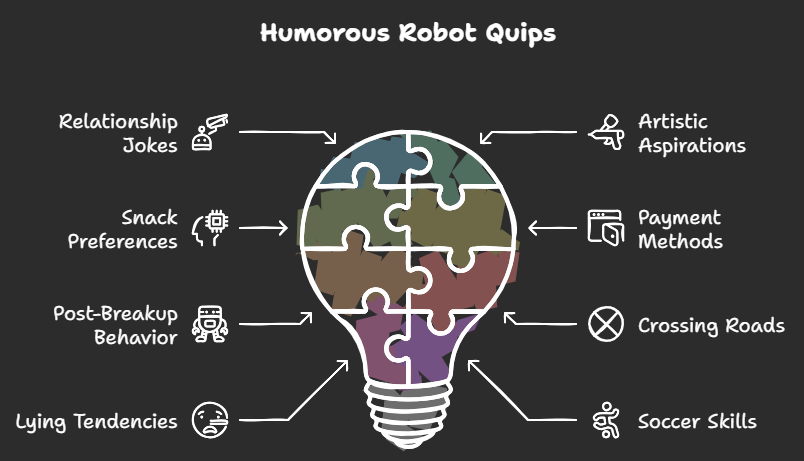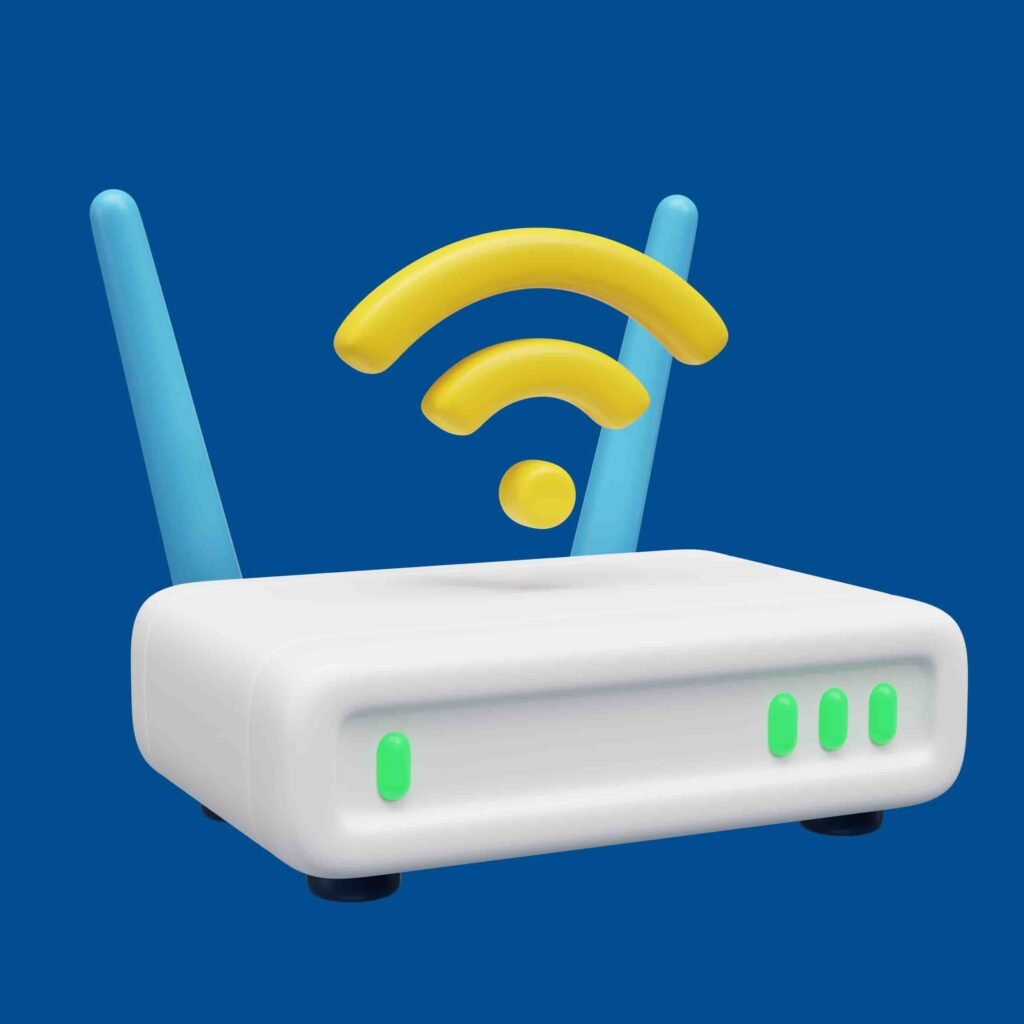When we think about robots, we picture cold, mechanical devices obediently following instructions meant to help in work or leisure. But as people, we find practically anything humorous, and robots are no exception. In popular culture, robot puns have exploded and become a means of fusing lighthearted fun with the sober world of technology. This post delves further into why we enjoy robot puns, how they affect humor, and—of course—many punny examples along the way.
Why Are Robot Puns So Funny?
It helps us to appreciate why we find robot jokes funny before we enter their realm. Robots by nature are exact and rational. They are not funny, at least not on intention. This makes the act of seeing robots in funny situations a naturally ridiculous juxtaposition. Perfect robots free of human-like flaws, emotions, or eccentricities are expected. But when we humanize them in jokes, we create a humorous contrast between what they are and what we project upon them.
A pun is a play on words whereby one word is replaced with another that sounds similar, therefore producing double meanings or adding comedy. Combining the inflexible character of robots with wordplay creates even more irony that accentuates the comedy. Moreover, the growing relevance of technology and artificial intelligence in our daily life makes these jokes relevant and appropriate.
1. The Funniest Robot Puns for Tech Lovers
Let’s start with the classics—here are some robot puns that will have you rolling with laughter:

- Why did the robot break up with its vacuum?
Because it just sucked the life out of their relationship. - Why did the robot become an artist?
It had a creative spark! - What’s a robot’s favorite snack?
Microchips with dip. - How do robots pay for things?
With cache! - What did the robot do after a breakup?
It had a complete meltdown. - Why did the robot cross the road?
To upgrade its drive. - What do you call a robot that likes to lie?
A fibber-bot. - Why are robots bad at soccer?
They always get caught in offside mode. - What’s a robot’s favorite genre of music?
Heavy metal, of course. - Why was the robot always calm?
It never let anything short-circuit its mood.
These jokes gently poke fun at robots’ claimed flaws or habits by giving them characteristics that reflect our own, therefore capturing the mix of technological-based humor and conventional wordplay.
2. Robot Romance: Love in the Digital Age
Someone claims robots cannot experience love. Although real robots might not yet possess feelings, there is plenty of space to picture them in romantic contexts. Here are several puns illustrating the softer side of these metallic entities:
- How do robots show their love?
They send each other encrypted love letters. - Why did the robot get married?
It found its perfect match online. - What do robots call their partners?
Their byte-sized sweethearts. - Why did the robot propose?
Because it knew it had found the one and only compatible system. - How do robots break up?
With a Ctrl + Alt + Delete to the heart. - What do robots say after a romantic dinner?
“You’ve got me all charged up!” - Why was the robot blushing?
Its circuits were overloaded with feelings.
Imagine robots participating in such events in a world when love is sometimes erratic and emotional to create a funny contrast. With dating applications and virtual love all around us, it also suggests the rising junction of tech and romance.
3. Robots in the Workplace: Puns About Automation
In today’s workforce, automation is a hot issue since robots are replacing humans in duties usually done. This has obviously resulted in an explosion of robot humor connected to the workplace. These puns draw attention to our changing connection with technology, whether it’s lighthearted fun at the tirelessness of our robotic colleagues or their demand for efficiency:
- Why did the robot get promoted?
Because it knew how to optimize every task. - What’s a robot’s work ethic?
They’re always working on max performance mode. - Why don’t robots need vacations?
They never get burnt out. - Why did the robot quit its job?
It felt like it was stuck in a repetitive loop. - How does a robot multitask?
By parallel processing. - What do robots use to write their resumes?
Auto-fill software. - Why do robots love office supplies?
Because they’re always staple to success. - Why did the robot start a business?
It had an idea that really clicked with investors. - What’s a robot’s least favorite meeting?
Brainstorming—they prefer tasks with clear instructions.
In the workplace, robots frequently represent efficiency; these puns gently examine that. These jokes will probably keep changing as automation is more prevalent, mirroring our changing opinions about artificial intelligence and its influence on employment.
4. Malfunction Mayhem: Puns About Robots Gone Wrong
Robots malfunctioning create a certain form of humor since, after all, they can create some funny outcomes when machines go crazy. These puns show the humorous possibility of robots making mistakes:
- Why did the robot crash its car?
It had a major data loss while driving. - What happens when a robot tells a lie?
It experiences a severe logic error. - Why was the robot so stressed?
Its memory was full, and it couldn’t delete old files. - What did the robot do when it got frustrated?
It pressed Ctrl + Alt + Delete on life. - Why did the robot’s GPS fail?
It forgot to download the latest location update. - What do robots do when they’re angry?
They suffer from a system overload. - Why did the robot’s phone stop working?
It couldn’t handle the latest software patch. - How do robots fix their problems?
By running a self-diagnosis check—or calling tech support.
These puns capture our obsession with what follows from technological failure. After all, we find comedy in the times when machines fail even though we depend on them to be exact. It’s a good reminder that imperfections abound even in machines.
5. The Future of Robot Humor: Can AI Crack a Joke?
For decades, we have been laughing at robots; but, here’s a fascinating turn of events: what if robots could deliver their own jokes? Already, artificial intelligence can generate literature, poetry, and even artwork. But humor—especially puns—is a sophisticated kind of expression that calls for knowledge of wordplay, context, and timing.
Though humor is one of the toughest things machines can learn, thus far AI-generated jokes usually fall flat. Puns typically depend on cultural references and a strong awareness of language subtleties—areas where artificial intelligence is currently catching up.
An artificial intelligence might create, for instance, a joke like this:
Why did the robot go to school?
To pick up debugging techniques for its code.
Though not the worst attempt at humor, artificial intelligence still lacks the depth of knowledge that lends appeal to human-made jokes. But who knows as artificial intelligence keeps getting better? We might be chuckling at robot-written puns one day.
6. The Role of Robot Humor in Our Tech-Driven Lives
In a time when technology is developing quickly, comedy fills in to close the distance between people and machines. Robot jokes help us to keep control and amusement in a time when robots are progressively part of our daily existence. They also remind us that a good laugh will always be welcome regardless of how developed technology gets.
Conclusion
Robot puns add amusement to our ever more automated environment by combining the finest of technology and comedy. These jokes remind us that laughter is vital even in a tech-centric society, whether we’re laughing at a robot’s immaculate efficiency in the workplace or its incapacity to process emotions. Therefore, keep in mind that there is always a pun just waiting to be shared the next time you come across a robot.

